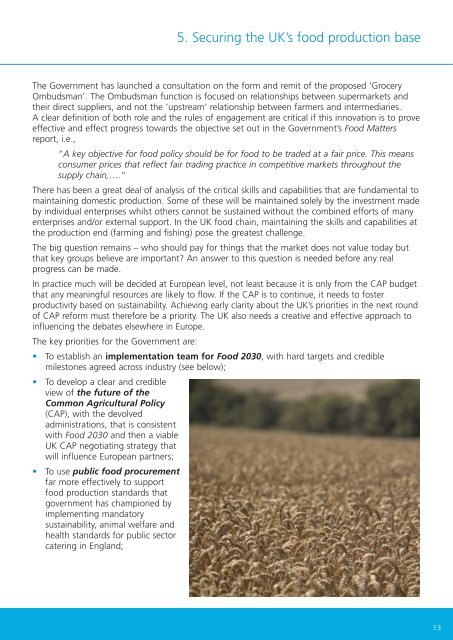Food: a recipe for a healthy, sustainable and successful future
Food: a recipe for a healthy, sustainable and successful future
Food: a recipe for a healthy, sustainable and successful future
Create successful ePaper yourself
Turn your PDF publications into a flip-book with our unique Google optimized e-Paper software.
5. Securing the UK’s food production base<br />
The Government has launched a consultation on the <strong>for</strong>m <strong>and</strong> remit of the proposed ‘Grocery<br />
Ombudsman’. The Ombudsman function is focused on relationships between supermarkets <strong>and</strong><br />
their direct suppliers, <strong>and</strong> not the ‘upstream’ relationship between farmers <strong>and</strong> intermediaries.<br />
A clear definition of both role <strong>and</strong> the rules of engagement are critical if this innovation is to prove<br />
effective <strong>and</strong> effect progress towards the objective set out in the Government’s <strong>Food</strong> Matters<br />
report, i.e.,<br />
“A key objective <strong>for</strong> food policy should be <strong>for</strong> food to be traded at a fair price. This means<br />
consumer prices that reflect fair trading practice in competitive markets throughout the<br />
supply chain,….“<br />
There has been a great deal of analysis of the critical skills <strong>and</strong> capabilities that are fundamental to<br />
maintaining domestic production. Some of these will be maintained solely by the investment made<br />
by individual enterprises whilst others cannot be sustained without the combined ef<strong>for</strong>ts of many<br />
enterprises <strong>and</strong>/or external support. In the UK food chain, maintaining the skills <strong>and</strong> capabilities at<br />
the production end (farming <strong>and</strong> fishing) pose the greatest challenge.<br />
The big question remains – who should pay <strong>for</strong> things that the market does not value today but<br />
that key groups believe are important? An answer to this question is needed be<strong>for</strong>e any real<br />
progress can be made.<br />
In practice much will be decided at European level, not least because it is only from the CAP budget<br />
that any meaningful resources are likely to flow. If the CAP is to continue, it needs to foster<br />
productivity based on sustainability. Achieving early clarity about the UK’s priorities in the next round<br />
of CAP re<strong>for</strong>m must there<strong>for</strong>e be a priority. The UK also needs a creative <strong>and</strong> effective approach to<br />
influencing the debates elsewhere in Europe.<br />
The key priorities <strong>for</strong> the Government are:<br />
• To establish an implementation team <strong>for</strong> <strong>Food</strong> 2030, with hard targets <strong>and</strong> credible<br />
milestones agreed across industry (see below);<br />
• To develop a clear <strong>and</strong> credible<br />
view of the <strong>future</strong> of the<br />
Common Agricultural Policy<br />
(CAP), with the devolved<br />
administrations, that is consistent<br />
with <strong>Food</strong> 2030 <strong>and</strong> then a viable<br />
UK CAP negotiating strategy that<br />
will influence European partners;<br />
• To use public food procurement<br />
far more effectively to support<br />
food production st<strong>and</strong>ards that<br />
government has championed by<br />
implementing m<strong>and</strong>atory<br />
sustainability, animal welfare <strong>and</strong><br />
health st<strong>and</strong>ards <strong>for</strong> public sector<br />
catering in Engl<strong>and</strong>;<br />
13








